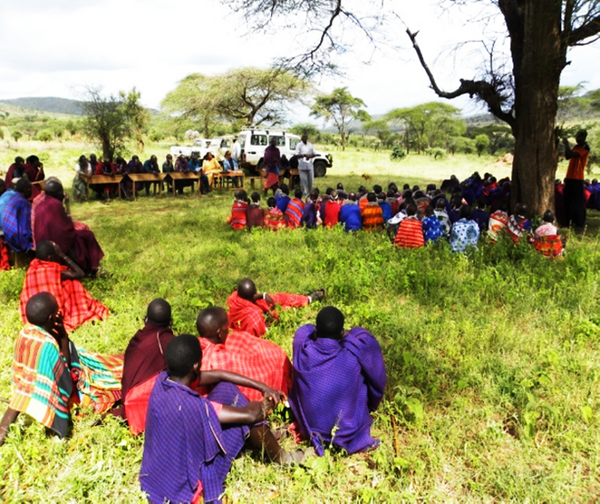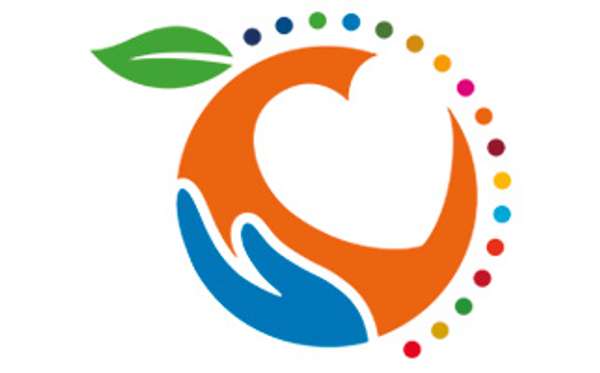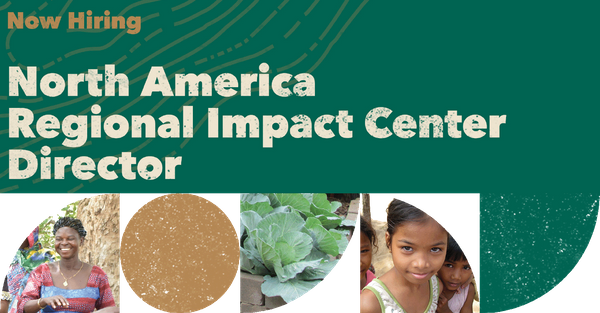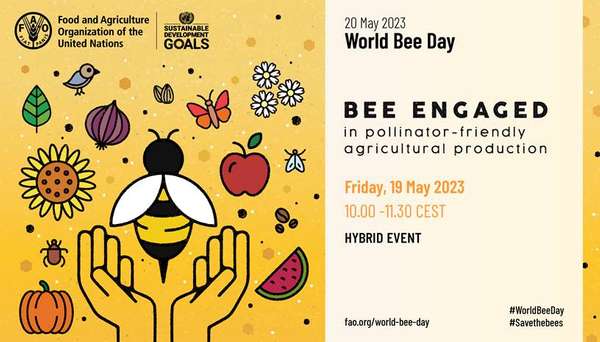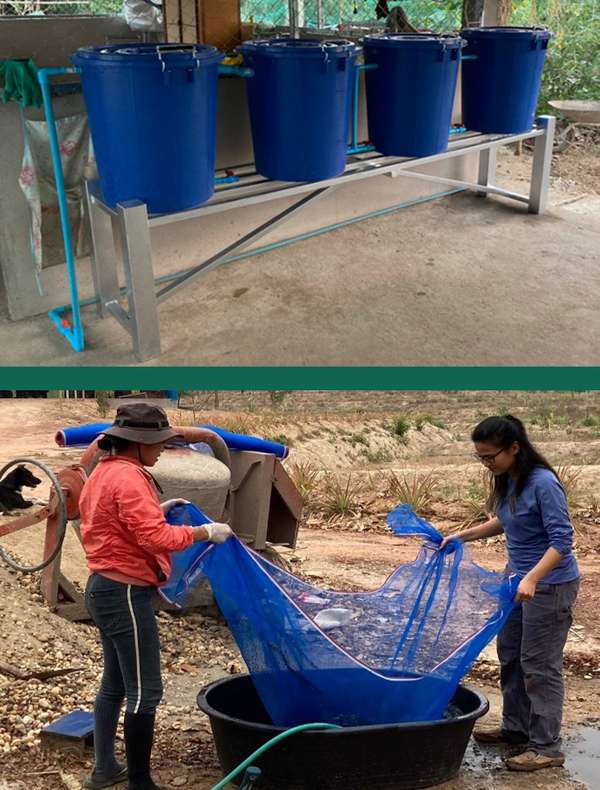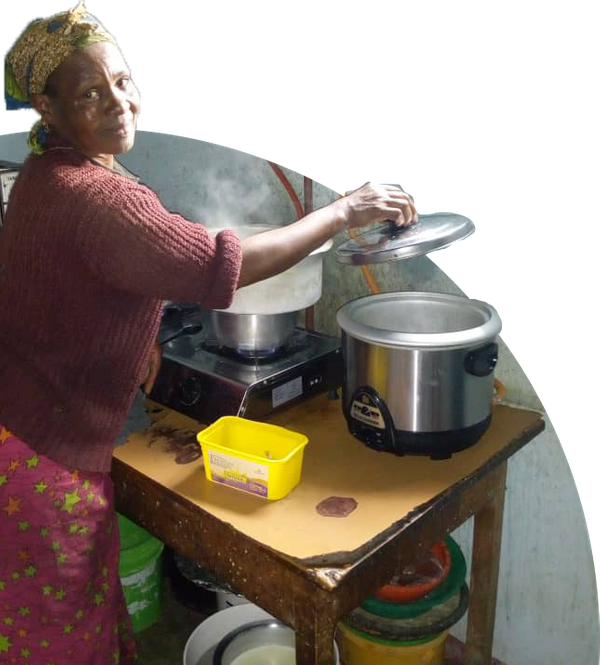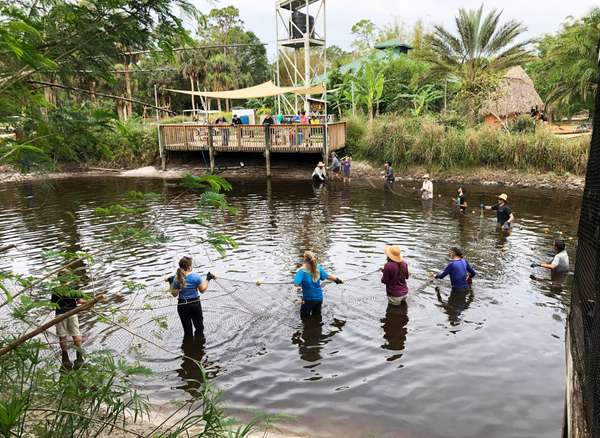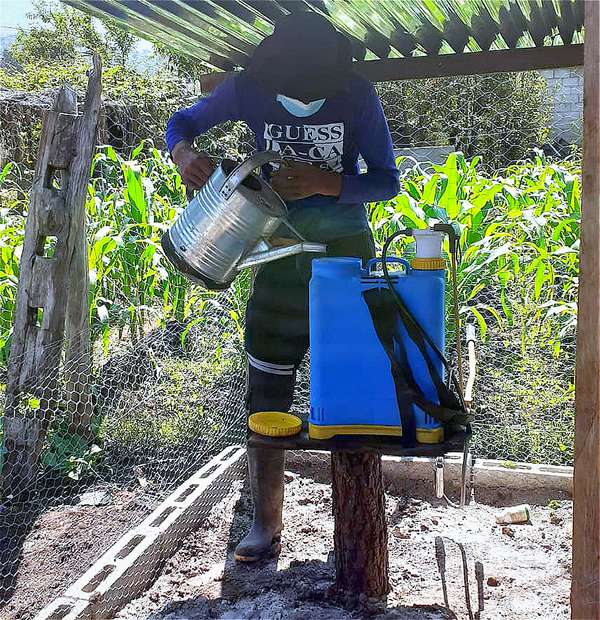Thông Tin Cộng Đồng ECHO
Black Soldier Fly Larvae Production Technical Note (no 99) Now Available! 2023-06-21
Black soldier fly larvae are grown for their protein- and fat-rich biomass that can be fed to many types of livestock. This production guide is based off of the scaled-up system at the ECHO Asia Small Farm Resource Center. The authors encourage adaptation to fit the needs, resources, and constraints of your local context. The end of this article includes some considerations for household-level operations.
EXCERPT: To collect the eggs of the adult female BSF, provide favorable material for laying eggs within the mating enclosure. The ECHO Asia Farm discovered that small blocks of wood work well and provide both an inviting egg-laying environment and easy egg collection method for the workers. Using small pieces of cardboard may be logical (Wong, 2020), but the wooden blocks are convenient for collecting eggs and result in higher quantities of eggs as experienced by ECHO Asia staff. At this stage, it is important to note that BSF do not lay their eggs directly on (or in) a food source, but nearby to one. Blocks should be near a food source.
ECHO East Africa Note 10 Now Available! 2023-06-07
The issues surrounding current pastoralist practices are complex. A recent ECHO East Africa symposium focused attention on some crucial issues. It also addressed several potential remedies for the conflicts and challenges. This issue of ECHO East Africa Notes focuses on pastoralists and what interventions ECHO has found effective in serving pastoralist communities.
Download ECHO East Africa Note 10 Read ECHO East Africa Note 10 Online
- Maasai Pastoralists: Practices, Culture, and Role in Tanzanian Society
- Combating Hunger Among Pastoralists
- Intervention Descriptions for Food Security in Pastoral Communities
- Ferrocement Grain Storage
- Impact assessment of perennial vegetable training on attendees at hospitals and clinics
Let's celebrate 2023 World Food Safety Day! 2023-06-06
June 7th, 2023
This year's theme for world food safety day is "Food standards save lives" as we work together to keep food consumers safe across the globe. On this important global day, we recognize the importance of food safety awareness, ways to prevent illness through food safety, collaborative efforts to improve food safety, and the promotion of solutions and technologies to make food safe. In preparation for this year's food safety day, the FAO has published the event guide in 6 languages (English, French, Russian, Spanish, Arabic, and Chinese).
Download a guide to world food safety day 2023
Learn more about Food Safety Day 2023
ECHO is looking for a Director to lead our North America Impact Center, located in Fort Myers, Florida 2023-05-30
ECHO is seeking a director to lead our North America Regional Impact Center to ensure that ECHO’s Florida presence can better support:
- North Americans who are currently serving internationally,
- North Americans who are aspirational for international service and
- North Americans and those working with them who are facing food insecurity and livelihood challenges.
Apply or read more about this position
This experienced leader will work to ensure that the core functions of ECHO’s global mandate (providing the identification, validation, dissemination, and evaluation of appropriate options to our diverse network) are serving a North American audience with purpose and focus for accomplishing the global mission and vision of ECHO. This position encompasses roles and responsibilities that are critical to the continued relevance of ECHO in the coming years.
Please help us share this opportunity with your network.
Vetiver Network's 7th International Conference on Vetiver Hybrid Event! 2023-05-23
Chiang Mai, Thailand & Online | May 29 - June 1, 2023
This hybrid event will be both in-person and online! Registration is still open (please ignore the May 15th deadline) for you to participate in this collaborative and educational event. The conference keynote speaker is Dr. Rattan Lal who has extensive experience with vetiver technologies. There will be exhibitions on the utilization of vetiver grass projects and vetiver handicraft training. A post-conference tour will head out into the field for a technical dive into vetiver applications. The conference will take place in-person at the Shangri-La Hotel in Chiang Mai, Thailand. Portions of the event will also be available online!
Register Here Learn more about the conference
FAO's Annual World Bee Day May 20, 2023 2023-05-17
Bees are vital to food systems and ecosystems globally. ECHO recognizes the importance of bees and other pollinators and promotes pollinator-friendly agricultural production. We also know that many of you, our network members, directly benefit from tending bees in your community. Please take the time to share and learn together to help increase awareness of the importance of pollinator-friendly practices. Together we can increase resilience, sustainability, and production of food systems around the world.
FAO's event will be hybrid (in-person and virtual). FAO also has pollinator-friendly agricultural videos.
Register Here Protecting Pollinators Video Series
ECHO Asia update - water filtration learned at the last TAD course! 2023-05-16
By Drew Lemos, ECHO Asia TAD participant
Living Water Organic Farm, Ban Nakhai Laos
We first learned about the four-barrel water filter design while searching for low-cost filters on Youtube that we could build on our farm. So, of course, we were very excited to hear that we would make one at the ECHO Asia Training Center Farm in Chiang Mai months later. We realize we need it on our farm. We got the training, built one, and it worked! Our system was a small one, with only a seventy-liter capacity. It cleaned up the water significantly to where it was usable again.
A 4-barrel water system with 70 liters of capacity was used. These were typical trash cans bought brand new from the home improvement store. Economical and easy to work with because we did not have to clean any residual soap or liquid out of it. River rock of all sizes, sand, and biochar were used as the filtering medium. We also used a simple in-line shut-off valve instead of the ball valve. We followed the ECHO Asia training to clean the different filter materials. We utilized the blue mesh we had on the farm and a plastic tub to clean any loose soil and dust from the other materials. The stand that I constructed was 50 cm tall and made from metal. I would make it with a heavier-duty metal that could handle more barrels for increased capacity.
Learn about ECHO Asia's Next Course Learn about ECHO Florida's Next Course!
ECHO East Africa Symposium on Appropriate Technology Innovations and Renewable Energy 2023-05-09
August 9-11 | Arusha, Tanzania
You are invited to join us for the 1st ECHO East Africa Symposium on Appropriate Technology Innovations and Renewable Energy. We hope that you will make time to gather with us at this very important sharing opportunity. It will be a valuable time of learning, information sharing, and networking for those working and serving in the East Africa Region.
Learn more about the Symposium!
Symposium planners hope to include the following technologies:
- Biogas for domestic and productive use
- Water hygiene and sanitation, productive use
- Food harvesting, processing and packaging
- Post harvest processing and handling
- Honey and beeswax harvesting and processing
- Milk and milk by products processing
- Solar energy for domestic and productive use
- Wind energy
- Conservation agriculture implements
- Livestock management and processing
- Seeds saving and sharing
- Draught power and implements
- Other livelihood related innovations
From ECHO's Farm: Fish Harvest 2023 2023-05-02
ECHO just harvested both aquaculture ponds, for last week's farmwork. The staff and volunteers, led by the interns and their supervisor (including ECHO's CEO), kept up the tradition and had fun doing this activity. We netted over 170 tilapia, 47 invasives, and a few bass and bluegills (caught and released for future sportfishing!) Participating staff held a luncheon, and then promptly continued to clean and fillet fresh tilapia for the ECHO community. As aquaculture grows in importance around the world, ECHO global farm shows another way to train our interns in this important activity in the fight against global hunger with local action.
ECHO in Latin America and Caribbean: Biological depositories 2023-04-25
ECHO traveled to Huehuetenango, Guatemala, where small farmers produce export crops besides their families’ basic needs. Using Integrated Pest Management, farmers produce vegetables for foreign tables. Preventive practices are first then safe botanicals for pest management follow. Under Safe Use Protocols, approved agrichemicals are the last resort to save a crop. Biological depositories or “biodeps” provide safe disposal for excess mixtures and washing equipment including backpack sprayers. Biodeps are required for use as a Good Agricultural Practice, GAP for certifying small-farmer exports and export throughout the region and to the United States and Europe.

